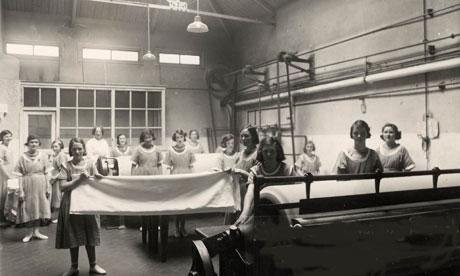By Mary Raftery
The Guardian
June 11, 2011
http://www.guardian.co.uk/commentisfree/2011/jun/08/irealnd-magdalene-laundries-scandal-un
 |
| Women in one of Ireland's Magdalene laundries in the 1940s |
The nuns had been dabbling on the stock exchange. The results were unfortunate. When a company they had invested in went bust, they decided to sell off a portion of their Dublin land holdings to cover the losses. The snag was that the land contained a mass grave. It was full of "penitents", the label attached to the thousands of women locked up in Ireland's Magdalene laundries. This particular order, the Sisters of Our Lady of Charity of Refuge, ran High Park, the largest such laundry in the country.
The good sisters did a deal with the developer who bought their land. They split the costs of clearing the mass grave, exhumed and cremated the bodies, and re-buried the ashes in another mass grave, in Glasnevin cemetery. However, it emerged that there were 22 more bodies in the grave than the nuns had listed when applying for permission to exhume. Over one-third of the deaths had never been certified. The nuns did not even appear to know the names of several of the women, listing them as Magdalene of St Cecilia, Magdalene of Lourdes, and so on.
The final number so callously disturbed from their resting place was 155. All had died in the service of the nuns, working long hours in their large commercial laundry for no pay, locked away by a patriarchal church and society ruthlessly determined to control women's sexuality.
This week the United Nations Committee Against Torture (Uncat) issued a highly significant statement on the Magdalene laundries. It criticised the Irish government for refusing to acknowledge the pain and abuse suffered by women incarcerated in the laundries, the last of which closed in 1996, and called for a thorough investigation and compensation scheme. In doing so, the UN has focused international attention on what has become a festering injustice.
Ireland has experience of dealing with the sins of its past. A formal apology was issued by the Irish government in 1999 to the tens of thousands of victims of child abuse in the country's vast industrial (residential) school system, run by Catholic nuns, brothers and priests. An exhaustive statutory inquiry produced the damning Ryan report, and a redress scheme has now cost around £1bn.
There has, however, been a strange resistance to any official acceptance of the injustice suffered by the Magdalene women. The state has wriggled and squirmed, claiming that the laundries were private institutions and all the women entered voluntarily. Uncat has now firmly rejected this, confirming what we in Ireland have long known in our hearts. We knew that women who escaped were caught by the police and returned to the punitive and often brutal regime within the laundries. Generations of Irish people colluded in this, using the laundries when it suited them to clean their clothes and control their daughters.
Some of the women in the laundries were unmarried mothers, others were locked away for what was euphemistically described as their own protection. Yet more were young girls transferred directly from the industrial schools.
Mary Norris ended up in a Magdalene laundry for disobeying an order. A teenage servant in Kerry, she took a forbidden night off, and was taken away to a convent where the nuns had her examined to see was she still a virgin (which she was). From there she was dispatched to the Magdalene laundry in Cork. Immediately on arrival, the nuns changed her name – standard practice in all the Magdalene laundries. "When I went in there," recalls Mary, "my dignity, who I was, my name, everything was taken. I was a nonentity, nothing, nobody."
The only way out was if a family member claimed you, and Mary was lucky. She had an aunt who tracked her down and got her out after two years of hard, unpaid labour.
And that of course is the rub. Where were the families of these women? For a society that prided itself on its emphasis on family values, the large numbers of women and children locked away with no one to claim them points to a glaring double standard.
Irish society was deeply complicit in the incarceration of women and girls in the laundries. In what has been described as a culture of containment, Ireland locked up more of its citizens per capita than anywhere else in the world – not in prisons, but in psychiatric hospitals, Magdalene laundries and industrial schools. Anyone who did not fit within the cruelly narrow definition of good behaviour was in danger.
This then is the legacy that Uncat is forcing Irish citizens to face before it is too late for the relatively few surviving Magdalene women, most of whom are now elderly and living in impoverished circumstances.
The previous Fianna Fáil government hardened its heart against these women. The fear was that an apology, inquiry and redress might open the financial floodgates, much as happened with the industrial schools scheme. However, Magdalene survivors at this stage number in the hundreds, and any compensation scheme is likely to be relatively inexpensive.
In addition, there is a fundamental issue of justice for the women, which can only be addressed by an unconditional apology from the government. There has been considerable optimism that the more liberal Fine Gael/Labour party coalition would confront the past and make amends for what has become a shameful and very public injustice. Many of its individual politicians have in the past made public calls for apology and redress. Their response over the coming weeks to the Uncat conclusions will be an important measure of whether this government's promises to turn Ireland into a better, more honest and caring society represent anything more than hollow sentiment.
Any original material on these pages is copyright © BishopAccountability.org 2004. Reproduce freely with attribution.